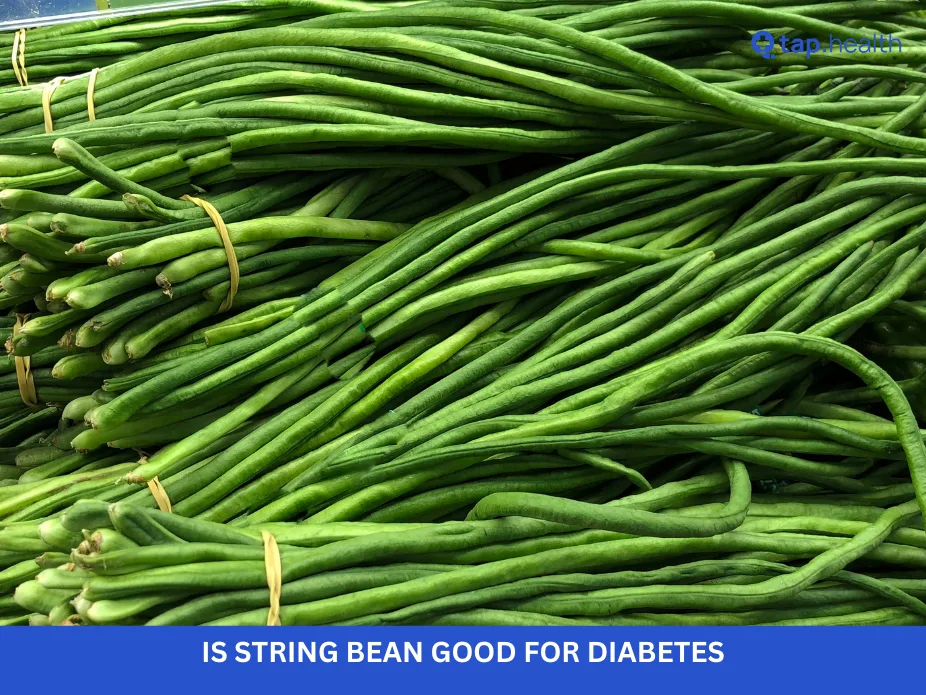When managing diabetes, every food choice matters. You’re probably always thinking about what to eat, what to avoid, and how certain foods will affect your blood sugar levels. One food that might come to mind is string beans. These crunchy, nutrient-packed vegetables often appear in salads, soups, and as side dishes. But is string bean good for diabetes? Can you enjoy them without worrying about your blood sugar?
In this blog post, we’ll break down everything you need to know about string beans and diabetes. We’ll cover the health benefits of string beans, how they impact blood sugar, and how to incorporate them into your diet in a healthy way. Plus, we’ll explore real-life scenarios, expert contributions, and helpful tips grounded in research to make sure you have the full picture.
What Are String Beans?
String beans, also known as green beans, snap beans, or haricot verts, are a type of legume. These green vegetables are commonly eaten fresh, but they can also be enjoyed frozen or canned. They’re low in calories and a good source of vitamins and minerals, such as vitamin C, vitamin K, folate, and fiber.
For people with diabetes, the fiber in string beans is especially beneficial. It helps slow down the digestion process, which can prevent blood sugar spikes after meals. Now, let’s take a deeper look at the health benefits of string beans and whether they’re good for diabetes management.
The Nutritional Value of String Beans
Before determining whether string beans are suitable for people with diabetes, it’s important to understand their nutritional content. Here’s a breakdown of what one cup (about 125 grams) of raw string beans provides:
- Calories: 31
- Carbohydrates: 7 grams
- Fiber: 3.4 grams
- Protein: 2 grams
- Fat: 0 grams
- Vitamins and minerals: Vitamin C (15% of the recommended daily value), Vitamin K (22% of the recommended daily value), Folate, Potassium, Iron
As you can see, string beans are very low in calories and contain a modest amount of carbohydrates. The high fiber content is particularly important, as fiber helps regulate blood sugar levels, making string beans an excellent choice for people with diabetes.
How Do String Beans Impact Blood Sugar?
1. Low Glycemic Index
The glycemic index (GI) is a measure of how quickly foods raise blood sugar levels. Foods with a high GI cause a rapid increase in blood sugar, while foods with a low GI cause a slower, more controlled rise. String beans have a low glycemic index, which means they are unlikely to cause blood sugar spikes when eaten in moderation.
A low GI diet is often recommended for people with diabetes, as it helps maintain stable blood sugar levels throughout the day.
2. High in Fiber
As mentioned earlier, string beans are a great source of dietary fiber. Fiber plays a critical role in managing blood sugar. It slows the absorption of sugar in the bloodstream, preventing rapid spikes in glucose levels. For diabetics, fiber helps maintain a more stable blood sugar level, making string beans a smart addition to your meals.
Fiber also helps improve digestion, prevent constipation, and support heart health. These benefits are important for people with diabetes, who are at a higher risk for heart disease and digestive issues.
Real-Life Scenario: Arvind’s Experience with String Beans
Arvind’s Journey in Delhi
Arvind, a 50-year-old man from Delhi, was diagnosed with Type 2 diabetes two years ago. Like many people with diabetes, he found it challenging to balance his love for food with the need to keep his blood sugar levels under control. He was concerned about his diet, especially when it came to vegetables.
Arvind had always enjoyed string beans as part of his meals, but he wasn’t sure if they were good for his diabetes. After doing some research and consulting his doctor, he learned that string beans are low in carbs and high in fiber, making them an excellent choice for managing blood sugar.
Now, Arvind includes string beans in his diet regularly. He enjoys them steamed, sautéed, or in vegetable stir-fries, and has noticed a positive impact on his blood sugar control. “It’s been a game-changer for me,” Arvind says. “I don’t feel guilty eating my favorite veggies anymore.”
Expert Contributions: Dr. Nisha Kapoor, Nutritionist
Dr. Nisha Kapoor, a renowned nutritionist based in Bangalore, emphasizes the importance of incorporating string beans into a diabetic diet:
“String beans are a fantastic addition to the diet of anyone with diabetes. They’re low in calories, high in fiber, and provide essential vitamins and minerals. The fiber content specifically helps to regulate blood sugar levels, making them an ideal vegetable for blood sugar management. When you combine string beans with a well-balanced diet, they can contribute to better overall health.”
Health Benefits of String Beans for Diabetics
Now that we’ve established that string beans can be beneficial for managing blood sugar, let’s look at some of the other health benefits they provide, particularly for those with diabetes:
1. Rich in Antioxidants
String beans contain several antioxidants, including flavonoids and carotenoids, which help protect the body’s cells from damage caused by free radicals. For people with diabetes, antioxidants play an important role in reducing inflammation and preventing complications like heart disease and nerve damage.
2. Supports Weight Management
String beans are low in calories and high in fiber, making them a great food choice for those looking to maintain or lose weight. Maintaining a healthy weight is crucial for managing Type 2 diabetes, as excess weight can lead to insulin resistance.
3. Improves Heart Health
People with diabetes are at an increased risk of developing heart disease. Fortunately, the fiber, antioxidants, and other nutrients in string beans can help improve heart health. Fiber helps lower cholesterol levels, and the antioxidants can reduce inflammation and oxidative stress, both of which contribute to cardiovascular disease.
How to Include String Beans in Your Diabetes Diet
Now that you know the benefits of string beans, how can you include them in your meals? Here are a few simple ideas for adding string beans to your diabetes-friendly diet:
1. Add Them to Salads
Fresh string beans make a great addition to salads. You can steam or blanch them and toss them with other vegetables, such as cucumbers, tomatoes, and leafy greens. Add a little olive oil and lemon juice for a refreshing and healthy salad.
2. Make a Stir-Fry
Stir-frying string beans with other non-starchy vegetables, like bell peppers, broccoli, and onions, makes for a quick and tasty meal. Use olive oil or avocado oil, which are healthy fats, and add a lean protein source like chicken or tofu for a balanced dish.
3. Include Them in Soups and Stews
String beans work well in soups and stews. Add them to your favorite vegetable or chicken soup for added fiber and nutrients. They’ll soak up the flavors of the broth, making them a satisfying addition.
4. Enjoy Them as a Side Dish
String beans can be enjoyed as a simple side dish. You can steam or sauté them with garlic and olive oil for a quick and healthy accompaniment to your main meal.
FAQ Section: Is String Bean Good for Diabetes?
1. Are string beans low in carbs?
Yes, string beans are low in carbohydrates, with one cup containing only 7 grams of carbs. This makes them a great choice for people with diabetes who need to monitor their carb intake.
2. Can I eat string beans every day?
Yes, you can include string beans in your daily diet. They are low in calories, rich in fiber, and packed with vitamins and minerals that can support overall health.
3. What is the best way to cook string beans for diabetes?
Steaming, sautéing, or lightly stir-frying string beans are great options. Avoid frying them in heavy oils, as this can add unnecessary fats and calories.
4. Are there any risks to eating string beans for diabetics?
String beans are generally safe for diabetics. However, if you have any allergies or digestive issues, it’s best to consult with a healthcare provider before adding them to your diet.
Conclusion: Is String Bean Good for Diabetes?
In conclusion, string beans are an excellent choice for anyone with diabetes. They are low in calories and carbohydrates, high in fiber, and rich in essential vitamins and minerals. The fiber in string beans helps regulate blood sugar levels, making them an ideal food for people managing diabetes.
By including string beans in your meals, you can enjoy a healthy, delicious, and blood sugar-friendly vegetable that supports overall health. Whether you steam, sauté, or toss them in a salad, string beans are a versatile and nutritious addition to your diabetes-friendly diet.




